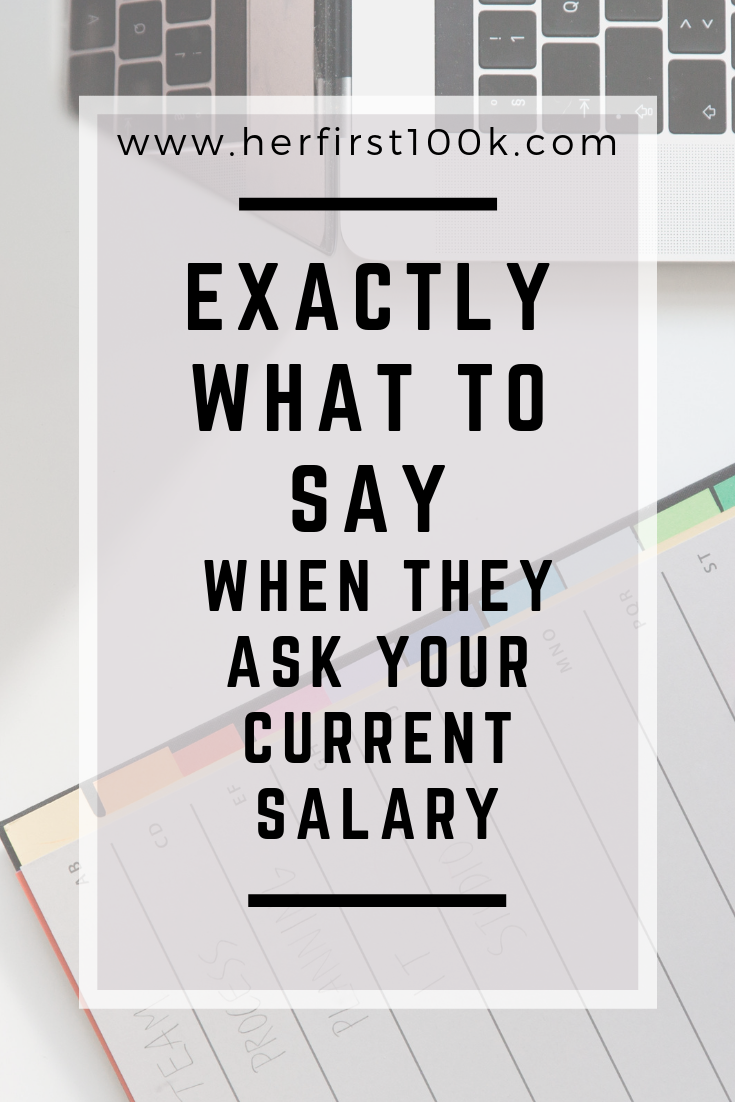The following article may contain affiliate links or sponsored content. This doesn’t cost you anything, and shopping or using our affiliate partners is a way to support our mission. I will never work with a brand or showcase a product that I don’t personally use or believe in.
The Script for the Salary Question
If you’re like me, you’ve been on more job interviews than you’d have liked.
And you know you’ve been on too many when they start to feel exactly like online dating. Be super vulnerable and spill your soul? Sure. Get emotionally attached? Yep. Ultimately get rejected? Likely. You put in a ton of effort for something you know is probably not going to work out any way. UGH.
There are ways to prep for the interview itself (here’s the end-of-interview questions you want to make sure you ask, and what to do after an interview), but few people know the answer to the dreaded: “What are your salary expectations?”
My first thought when I get asked this is an expletive, then “IS THAT ALL I AM TO YOU,” and a bunch more internal grumbling. But even though it’s the worst (only to do outdone by “What is your current salary?”) you’re not going to stop getting asked it.
Most people think this question can be answered with little thought and almost no regard —”oh, I’ll just tell them a bit more than what I’m getting paid now.” But this question has severe consequences if you answer incorrectly — too low, you’ll leave serious money on the table; too high, you’ll get laughed out of the room.
Here’s how to answer with tact:
1. “I’m sure there’s a number we can collaboratively agree on.”
You’re displaying that you’re a team player that works towards solutions with others. In addition, you’re willing to work with them to come up with a salary that both parties can get behind.
2. “I’d be happy to discuss salary when I have a better understanding of the job expectations.”
At this point in the interview process, the company only has a very 2D understanding of you, your skills, and what you will contribute. You also don’t know that much about the company or the actual scope of the work. Therefore, answering the question in a way that displays preparation shows you’re committed to doing the best work possible, as you want to make sure you completely understand the task at hand.
READ MORE: How to Land the Job (When You Don’t Meet the Requirements)
3. “I’d love to know what you are at for this position.”
Throw the ball into their court. Most companies already have a number in mind, and will gladly offer the minimum number (in my personal experience, 90% of companies will have no issue giving you a general estimate.) They’re probably just as uncomfortable asking as you are, and will promptly give you a ballpark number. Expect to work up from there during negotiations.
4. “I don’t feel comfortable discussing salary at this stage of the process, but I can let you know if the number you have in mind is something I’m comfortable with.”
A variation of 3. You’re demonstrating you’re willing to play ball (why am I using so many baseball analogies?!) but feel a bit uneasy. Make sure you include the “at this stage in the process”, as it guarantees a general answer at some point (just not now.) Again, most companies will have no problem telling you where the position starts with pay.
5. “From my research for the market value of this role, my range is $X-Y.”
This is your last resort, and only if you are pushed to give an answer. The difference between the two numbers should be large enough for major wiggle room — I recommend $20k (for example, “My range is $55k-75k.”) Make sure you’ve done your research (duh!) on market value and what they’ve paid people for this position in the past (use sites like Glassdoor to start.) If you don’t do your research, you can end up estimating too low or too high. By telling the company you’re done your research — and being able to back it up if necessary — it shows you’re committed and prepared.
Please remember: no matter how much you want a job, you should never ever feel pressured to give an answer you’re not comfortable with. Yes, I haven’t been moved forward in the process because I didn’t feel comfortable giving an answer — that’s a harsh reality. But let’s be honest. If you’re a company that values how cheap you can get me, you’re not a company I want to work for.
Got another go-to answer to the dreaded question? Let’s talk in the comments!
Need to help mastering the job interview? Check out my best selling Job Interview Package!
RESOURCES
I get asked all the time: what are your favorite money management tools?
All-in-one financial dashboard: I love this tool for tracking your net worth and your progress towards goals like saving, debt payoff, and (yes!) $100K.
Ready to feel financially whole?
For the first time EVER, I’m teaching ALL the strategies that have helped countless women save money, pay off debt, and grow their net worth (but really, feel happier, healthier, and more f*cking powerful).
In The $100K Club, you’ll get in-depth teaching from me, alongside every template I use to manage my own money, PLUS a community of champions to keep you accountable.



